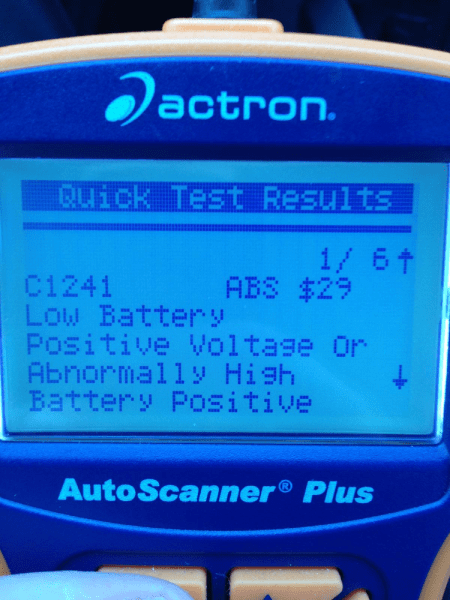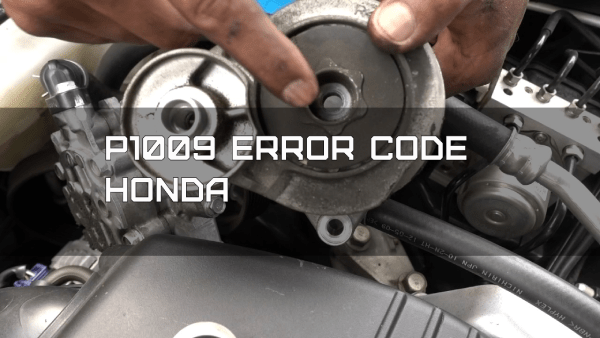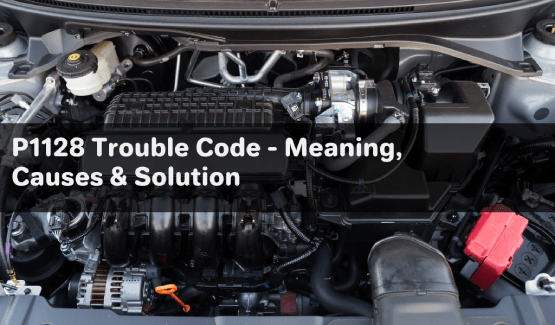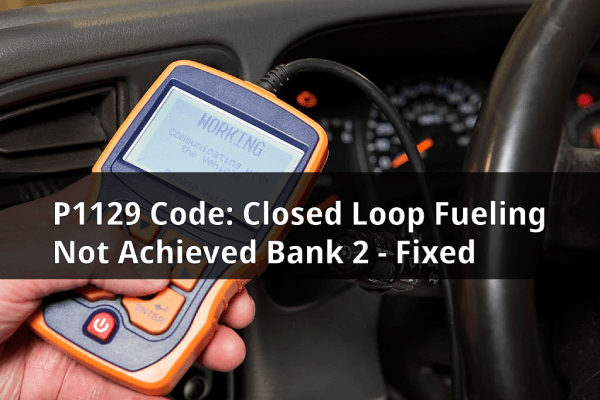The P0171 lean code is one of the most common problems that can occur in Toyota vehicles. When this code pops up, it indicates that the engine is running too lean or with an air/fuel mixture that contains too much air and not enough fuel.
This extensive guide will provide a detailed look at what causes P0171, how to accurately diagnose the issue, repair costs, and step-by-step instructions to fix it.
What Does the P0171 Code Mean on Toyota?
The P0171 code in a Toyota vehicle signifies that the fuel system is running too lean, meaning there is too much air or not enough fuel in the system. This condition is specifically detected in Bank 1, and it will display the following message on the scan reader: Fuel Trim System Too Lean (bank 1).
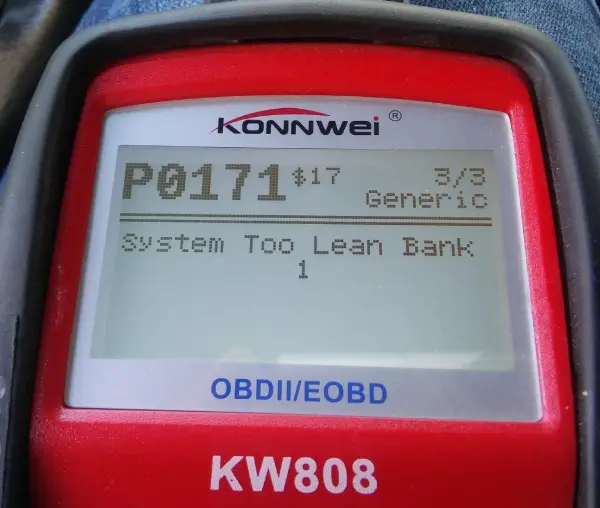
This causes a number of symptoms, such as:
- Lack of power
- Hesitation or stumbling on acceleration
- Rough idle
- Engine misfires
- Spark knock or pinging under load
- Stalling
- Hard starting
In addition to these immediate symptoms, prolonged driving with the lean code can lead to serious engine damage such as burned valves, eroded pistons, excessive engine wear, and overheating issues.
The ECM is programmed to maintain an optimal air/fuel ratio of 14.7:1 for most operating conditions. When bank 1 exceeds that ratio for a certain period of time, the P0171 code will be triggered and the check engine light will illuminate.
What Causes the Code P0171?
There are a number of possible causes or combinations of faults that can result in the P0171 lean code:
Vacuum Leak
One of the most common causes of the P0171 code is a vacuum leak. This allows unmetered air to enter the intake manifold, making the engine run lean. Potential sources of vacuum leaks include:
- PCV valve or hoses
- Vacuum supply hoses
- Intake manifold gasket
- Any rubber hose in the vacuum system
To find a vacuum leak, inspect all vacuum hoses carefully for cracks, holes, disconnects, kinks, or collapsing lines. Also, listen for a hissing sound with the engine idling, indicating a leak.
Mass Air Flow (MAF) Sensor
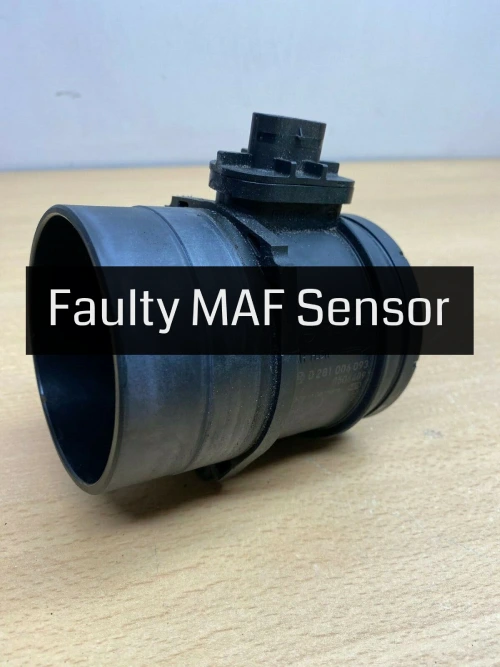
The mass airflow sensor measures the amount of air entering the engine. If it becomes contaminated or defective, it can incorrectly report lower than normal airflow. The ECM adds less fuel to match, causing a lean condition.
Scan tool data can show if the MAF reading doesn’t correlate to other sensors. Remove the MAF and clean it with electronics cleaner (or alternatives) or replace it if cleaning doesn’t work.
Fuel Pressure
Proper fuel pressure is essential for delivering the correct amount of fuel for optimal combustion. If fuel pressure is low, not enough fuel will be provided, causing a lean mixture. Issues include:
- Weak fuel pump
- Clogged fuel filter
- Leaking fuel pressure regulator diaphragm
- Malfunctioning fuel injectors
Use a fuel pressure gauge to test if pressure is within specifications. If it’s low, the pump, filter, and regulator will need inspection.
Exhaust Leaks
An exhaust leak upstream of the o2 sensor allows outside air into the exhaust. This air contains more oxygen, which makes the oxygen sensor report a lean mixture.
Visually inspect the exhaust components before the sensor. Look for cracks, damage, loose clamps, or carbon buildup indicating a leak. Ensure gaskets are intact.
You can check out our guide on exhaust repair costs.
Oxygen Sensor
The oxygen sensor reports the oxygen content of the exhaust to the ECM. If it is contaminated, damaged, or just worn out, it can falsely report a lean condition.
Oxygen sensors are a common check engine light cause. Replace the sensor(s) on bank 1 as a potential fix for P0171.
Step-by-Step Diagnosis of Toyota P0171
Accurately diagnosing the root cause of P0171 requires methodically checking each system that can cause a lean condition. Here is a complete step-by-step process:
Step 1: Scan for Codes
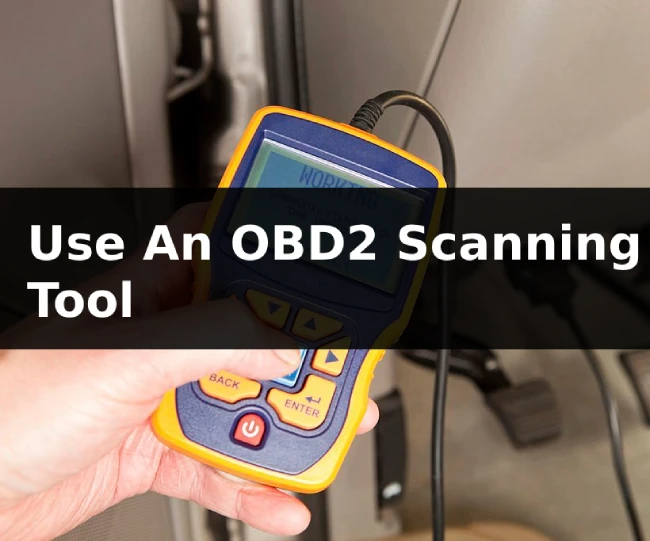
Connect a scan tool and read all stored diagnostic trouble codes (DTCs). Take note of any other lean condition codes like P0174 that could indicate which bank is affected.
Step 2: Inspect Air Intake System
Check for vacuum leaks by visual inspection and listening for hissing sounds. Ensure the air filter is clean. Remove and clean the MAF sensor. Verify all sensors have accurate readings with live data.
Step 3: Perform Fuel Pressure Test
Attach a fuel pressure gauge and verify pressure is within spec. If it’s low, check the pump, filter, injectors, and regulator. Replace any faulty components.
Step 4: Check Exhaust System
Inspect exhaust before oxygen sensor for leaks. Check gaskets, pipes, catalytic converter, and muffler for cracks or damage that could allow air in.
Step 5: Inspect Spark Plugs
Remove spark plugs one at a time and check their condition. White ash deposits indicate a lean mixture. Replace plugs if necessary.
Step 6: Replace Oxygen Sensors
If the lean condition persists, replace the oxygen sensors one at a time, clearing codes between each new sensor. Retest until the code is fixed.
Step 7: Verify Repair
After repairs are complete, clear DTCs and confirm normal operation. Perform a test drive to verify lean code is fixed.
What Does Fixing P0171 Typically Cost?
The cost to repair P0171 can vary quite a bit based on the root cause and the Toyota model you are driving. However, here’s a breakdown of what potential costs you might be looking at:
- Vacuum leak repair – $150-$250 for labor plus parts
- MAF sensor replacement – Around $350 for parts and labor
- Fuel pump replacement – $450-$850 for pump plus 1-3 hours labor
- Exhaust repair – $200-$500 if a section needs replacement
- Oxygen sensor – $150-$300 each, 1-2 sensors recommended
More extensive issues like bad fuel injectors can run over $1000+ to fix when accounting for parts and labor.
Is it Safe to Drive with Code P0171?
The short answer is yes, you can safely drive a vehicle with a P0171 lean code for a reasonable amount of time. This code alone does not necessitate immediately pulling over.
However, you should schedule repair work as soon as possible. Prolonged driving with the lean air/fuel mixture can decrease performance, fuel economy, and emissions. It could also potentially lead to overheating or gradual engine damage.
While not an emergency, a P0171 code does indicate an engine issue that needs attention soon. Addressing it quickly reduces risks of breakdowns or other problems. But for short durations, driving with light P0171 is okay, just be attentive to any related symptoms.
Can I Fix P0171 Myself?
For experienced DIY mechanics, issues like vacuum leaks and MAF sensor cleaning are very approachable fixes. With some basic tools, you can inspect and replace vacuum hoses, check for intake leaks, and clean the MAF sensor. Just be meticulous and take your time diagnosing.
However, if you’re finding the root cause requires fuel system testing and repairs, that’s when things get really challenging in your home garage. Accurately diagnosing problems with fuel pressure, injectors, pumps, and regulators requires specialized equipment most hobbyists don’t have access to.
So evaluate your skill level honestly, and don’t be afraid to hand it off to a pro if you’re not 100% certain about taking on P0171 yourself. A professional diagnosis is always a safe bet.
FAQ Related to P0171 DTC
Can a dirty air filter cause P0171?
Yes, a severely clogged air filter can restrict airflow, causing the engine to run lean. Replace the air filter if dirty.
Can bad spark plugs cause P0171?
No. Spark plugs do not directly cause this lean code. But inspect them once the root cause is fixed.
Can a bad gas cap cause P0171?
No. A loose or faulty gas cap normally sets evaporative emissions codes, not lean condition codes.
Can P0171 cause engine overheating?
Yes, prolonged extreme lean conditions from P0171 can lead to engine overheating and severe engine damage over time.
Can P0171 cause a misfire?
Yes, the lean condition from P0171 can lead to random misfires under load as cylinders are starved for fuel.
Will disconnecting the battery clear the P0171 code?
Temporarily. Disconnecting or replacing the battery resets all codes, but the P0171 will return right away if the root cause is not fixed.
In Summary
- The P0171 lean code is a common occurrence in Toyota vehicles, indicating bank 1 is running an excessively lean air/fuel mixture.
- Potential causes range from intake leaks to fuel system components to sensor issues. Proper diagnosis is crucial before replacing parts.
- Repair costs can range from a couple hundred dollars for simple vac leaks to over $1000 for fuel components or multiple sensor replacements.
- DIYers can handle basic diagnostics and intake repairs but should leave fuel system and oxygen sensor faults to professional mechanics.
Engineering Coordinator with 5+ years of experience in the automotive manufacturing industry. Currently supporting vehicle development and new model launch activities at Honda Development and Manufacturing of America. Skilled at managing engineering teams, overseeing prototype builds, coordinating testing, and driving continuous process improvements. LinkedIn

